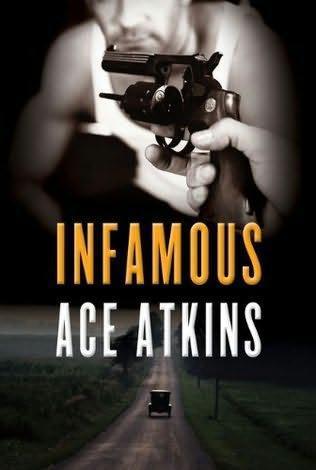
Infamous
کتاب های مرتبط
- اطلاعات
- نقد و بررسی
- دیدگاه کاربران
نقد و بررسی

February 22, 2010
Set in 1933, Atkins's winning fourth history-based novel focuses on two figures who, as the author explains in an introduction, have been undeservedly “lost in the shuffle of Depression-era gangsters”: George Kelly, who ironically gets saddled with the nickname “Machine Gun,” and his wife, Kathryn. The fast-moving narrative spans a three-month period, starting with a fatal ambush in a parking lot outside Kansas City's Union Station in which hoods gun down several lawmen and the prisoner they were about to drive to Leavenworth. This massacre leads to the FBI obtaining the authority to make arrests and carry weapons. The bulk of the action concerns the Kellys' kidnapping of Charles Urschel, a wealthy Oklahoma oilman, and its aftermath. Atkins (Devil's Garden
) brings to vivid life the henpecked George and the bloodthirsty Kathryn as he convincingly conjures up a past era. Not just for crime fans, this should appeal to a wide readership.

March 1, 2010
In his compulsively readable latest, Atkins (Devil's Garden, 2009, etc.) takes a revisionist look at the life and times of Machine Gun Kelly and the very bad woman who stood behind him.
"Poor George Kelly,"commiserates the author in a sort of preamble to his novel. Overshadowed by such Depression-era icons of iniquity as John Dillinger and Baby Face Nelson, he's been consigned to the dustbins of gangster history. But the truth is Kelly never had much gangster in him. Yes, he liked the ill-gotten gains part, the loot that could be lavished on fast cars and flashy women. What he lacked was the ambition and, for that matter, the meanness required for world-class wickedness. His beautiful wife had that in spades. Kelly's"one big score," for instance, was conceived, planned and, to all intents and purposes, carried through by the iron-willed Kit Kelly. To George, the kidnapping of oil magnate Charles Urschel was the kind of caper he relished reading about in the true-crime magazines while knowing in his timorous heart of hearts that he lacked the capability. To Kit, though, whose thirst for headline ink was unquenchable, snatching a multimillionaire was merely the means to a destined end."Jean Harlow is famous," an admiring friend tells her."Kit Kelly is infamous." Sweet music, but there are active anti-choristers. Among them, count a pair of stone killers quick to consider $200,000 worth of ransom money—a mighty large ticket in those hardscrabble days—as targets of opportunity. Bullets fly, gore puddles and, as the denouement approaches, oh how those pages turn.
Atkins, who loves his characters colorful, makes readers love them too, and it doesn't much matter whether they're naughty or nice.
(COPYRIGHT (2010) KIRKUS REVIEWS/NIELSEN BUSINESS MEDIA, INC. ALL RIGHTS RESERVED.)

February 15, 2010
With the 1933 kidnapping of Oklahoma oil baron Charles Urschel, small-time bank robber George Kelly became Machine Gun Kelly. Atkins latest historical novel based on a real crime (following Devils Garden, 2009, about the Fatty Arbuckle scandal) makes it clear that Kellys wife, Kathryn, was the driving force behind his ascendance. George is shown to be an affable mug, a feckless dandy more interested in two-toned shoes and 16-cylinder Cadillacs than crime and machine guns, a crook who was dismissed as a lightweight by other gangsters. Kathryn, however, is a force of nature, a preening, determined-not-to-be-poor-again shopaholic, a celebrity-obsessed Lady Macbeth. But its Atkins prodigious research that makes this novel a compelling road trip through Depression-era America. He vividly portrays the Dust Bowl, foreclosures, the grinding poverty, gnawing hunger, desperation, and the rage at bankers (most of which resonate in todays America); and he captures the imminent end of the gangsters heyday. Like many fine historical crime novels, Infamous offers a window on society, then and now.(Reprinted with permission of Booklist, copyright 2010, American Library Association.)

























دیدگاه کاربران